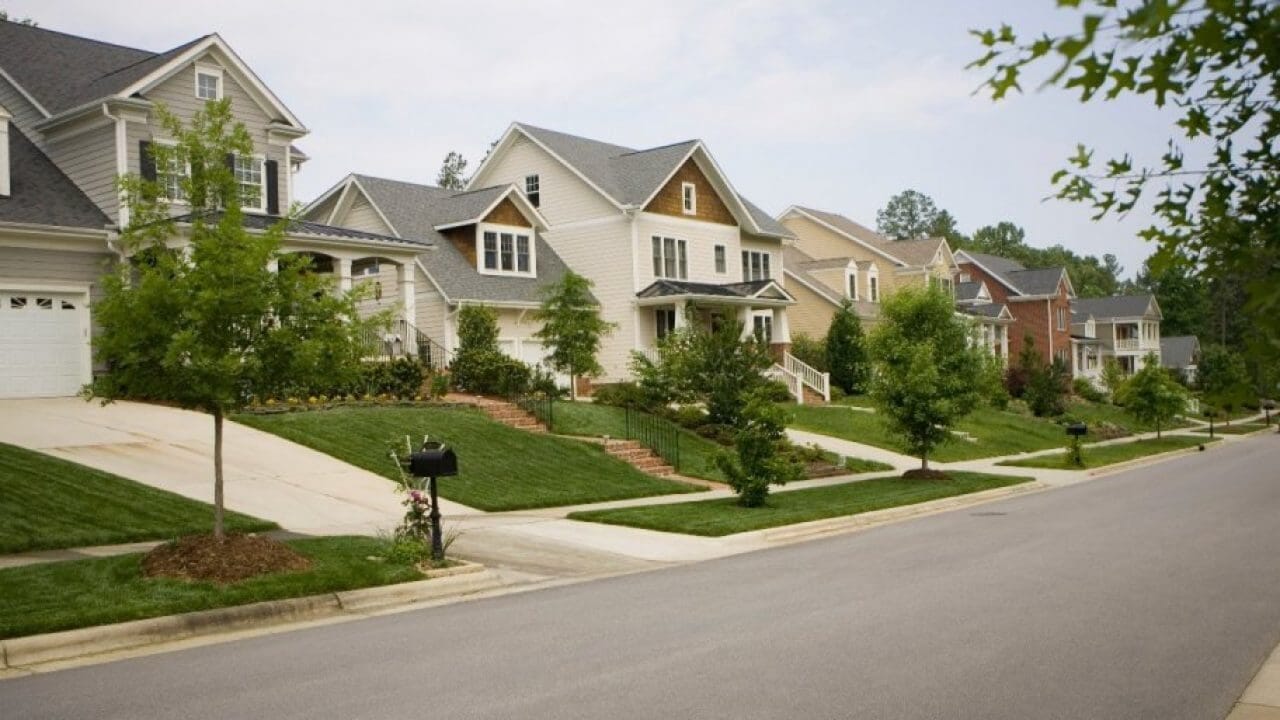Setbacks and other building placement restrictions are among the most common characteristics of the suburban operating system. Setbacks determine the disposition of a building and limit the ability of property owners to utilize their land. They’re so ubiquitous that we take them for granted, yet are profoundly impactful. Setbacks make historic building types and configurations (ie the historic Main Street, or residential townhomes) illegal, and as a result have completely changed the form of the city.
Recall our goal for regulation:
The beneficial purpose of regulation is to minimize negative externalities and maximize positive externalities.
Let’s break down building disposition rules and consider what the benefits and costs are, and whether alternatives are warranted.
Front Setbacks
Front setbacks emerged from two historic patterns.
Before they were required by cities, building setbacks were usually only found in very high-end subdivisions, required by deed restrictions — not local law. A lawn surrounding a home was a status symbol. The point of the setback was ensure only the wealthy could live in the neighborhood.
Owning land and not using it productively has long been a form of conspicuous consumption. Restrictive covenants that required a yard but prohibited using it commercially was an effective way to ensure your suburb stayed economically segregated.
But by the early 20th century, front setbacks were found to serve another useful purpose. Cities around the world began widening roads to make room for automobiles, and they were spending a lot of money knocking down buildings to do it. So early modern planners added setback requirements for all buildings, to save room to widen the roads in the future (and avoid the cost of taking and demolishing buildings along the way).
I would argue the first case — requiring unused land as a status symbol and tool of exclusion — is distasteful. But wealthy enclaves shouldn’t be illegal, they should just be appropriately taxed. So, if private developments want to include setbacks by deed restriction, I think that’s mostly fine.1
But the second case, the city leaving room for future road widening, is no longer relevant. Taking small neighborhood streets and converting them to multilane arterials was a mistake of the mid-century modernists, and cities have repented. Furthermore, with only a tiny number of exceptions, the rights of way in our cities are already wide enough: typically at least 40-50 feet in residential areas, and often 80-120 feet in commercial areas. That’s plenty of room to build over-wide stroads, which we don’t want in the first place.
So, in short, front setbacks should not be mandatory, and cities should let them go.
Side and rear setbacks
The “conspicuous consumption” purpose of front setbacks applies to side and rear setbacks as well, so the same conclusion applies. If a neighborhood wants to deed restrict itself, so be it. But is there a justification for these to be part of local law?
Side and rear setbacks are more interesting than front setbacks, because there’s a clearer externality here. If my neighbor builds directly against my lot line, that affects my land. It might result in less privacy if he builds windows directly overlooking my property. Or it might block the sun and mess up my vegetable garden. I might hear the noise from his house more easily, which I would rather not. It really just depends on who the neighbor is and what they want to do against the lot line.
The problem is, side and rear setbacks are a blunt instrument to deal with these nuisances. In effect, because someone could use the edge of their lot in an obnoxious way, nobody gets to use the edges of their lot for anything at all.
A better solution here would be reciprocal easements. In other words, I should have a property right that prevents my neighbor building directly against our shared lot line, and my neighbor should too.
As a starting point that works the same as things work today — neither of us can build against the lot line. But there are two key differences:
First, this protection is stronger than zoning. As a property right, the city can’t change the text of the zoning code and take that buffer space away from me.
Second, this protection is more flexible than zoning. If I or my neighbor want to do something in that easement, we can negotiate and work it out.
That flexibility is especially powerful. Imagine I wanted to build backyard cottage, and I’d like it to be right against the property line instead of needing to leave a 5’ buffer. Instead of having to go through 6+ months of zoning commission hell, I could just go next door and ask my neighbor if he would mind. He might say “no way,” or he might say “go for it.” But it’s more interesting than that, because if he was hesitant I could also offer to pay for it. Maybe he doesn’t really want a cottage against his fence, but if I offered to pay him $10k for it, he might feel that was worth it. Or maybe he would say, “I’m okay with a cottage as long as it’s just one story and doesn’t have any windows that look into my yard.” And we can just work that out!
Height limits and similar requirements
There are many other building disposition requirements that could be solved more effectively via property rights. Height restrictions and other bulk plane requirements are usually justified by a desire to preserve sunlight on the street and to prevent casting excessive shadows on surrounding buildings. In very dense places like Manhattan, these design requirements probably make sense, but there are very few places with that kind of density, and general rules of thumb don’t always apply in exceptional places.
For the large majority of normal places, sun rights would be a more elegant solution than height requirements for the same reason that reciprocal easements are better than mandatory setbacks.
In my neighborhood, a lot of small, one story houses have been replaced with taller townhomes. In general I think that’s a great thing, and I’m happy to see it happen. If it happened on the lot to the north of me, I don’t care at all. But as a quirk of how my house is laid out, I don’t get a lot of sun in my yard, so if someone built a very tall house to my south, I would lose most of the limited sunlight my yard gets today.
If I had sun rights, then I wouldn’t have to worry about that. My neighbor could come talk with me about building something taller, and if he positioned it in a way that didn’t block the sun from my yard, then I’d have no issue with it (and no right to block it). If he wanted to block the sun from our yard, I’d rather not sell that right. But of course, if he wanted to buy that right from me, we might be able to agree to a price that was worth it to me.
Note that sun rights — or “solar access rights” — are becoming more common as solar panels become more economical and desirable. So many states are already on this path.
Conclusion
The moral of the story here is that property rights are a powerful tool that cities have been squashing for the last hundred years, and one of the best ways we can minimize negative externalities is to bring them back. Cities could convert existing setbacks to reciprocal easements before dropping the requirements, and going forward developers could decide whether they want to include reciprocal easements as a feature for the subdivision or not, depending on what’s in demand. Similarly, sun rights could be an alternative to height limits, protecting property owners from losing sunshine without requiring inflexible bans on taller buildings.
There are many more examples like this we could explore — and many cases where rights like exist and have been used. The point of this essay isn’t to enumerate them all, but just to illustrate this way of thinking. Rather than prohibit all of something because sometimes it could impose a cost on a neighbor, give neighbors rights and let them negotiate to either block it, mitigate it, or be compensated for it. In so doing we minimize the negative externalities, while unlocking more freedom and flexibility for our cities to adapt over time.
I would argue that deed restrictions and other private covenants are actually a powerful ally of broad liberalization, because they allow the most intense NIMBYs to create small bubbles for themselves without encumbering the rest of the city. I may explore this more in a future post.






Banger Andrew.
Are you familiar with Ronald Coase?
https://en.m.wikipedia.org/wiki/Coase_theorem
Seems like in general it would weaken the power of zoning changes for good or ill.
If Euclid were overturned, and we did this change, would we be better off?
So, I'm working with a small town whose fire department cannot properly attack a fire in a structure more than 36 ft in height. But zoning is gone. Will the property owner who wants to build higher remedy this, which in this case would require not just new apparatus, but a new building?
So, I screw up the propane tank on my grill and my deck at the rear of the house is ablaze. But a few years ago my neighbor and I put tool sheds along the property line. Where do firefighters lay hose? Through the front door, I guess.
So, the zoning has gone. I decide that I need more space and cover my lot with a roof. Even if that doesn't shade a neighbor, it doubles the storm water runoff. Am I prepared to cover the unanticipated cost to the community that is responsible for the quality of the runoff?
None of this is to say that we can't build tall buildings or attached buildings or that we can't have full lot coverage where that has been properly anticipated. All of it is to say there are dozens of reasons why the rules are what they are. The connection between the reason and the rule is not always ideal, but civic life involves a lot more than two neighbors agreeing about an immediate issue.
BTW, while Houston does not have a zoning map. It does have height limits and setbacks. It even has numerous written regulations that affect the location of particular uses just like a zoning map would.
I take Seth's point, below. Recordation of thousands of easements, which reciprocal rights would be, is possible, but you'd have to create a separate court system to manage it in a city of any size. Likewise, his point about that approach inhibiting rather than allowing incremental change. It would cut both ways, I think, with some benefits, but most people are risk averse so my bet is that it stifles even simple positive changes more often than not.
Local land use regulation is imperfect. Seriously so, sometimes. But despite all you read these days it did not arise as a tool of segregation. It was quickly adapted to that in many places, and that's sad. But it shouldn't obscure the purely practical reasons for regulating land use.